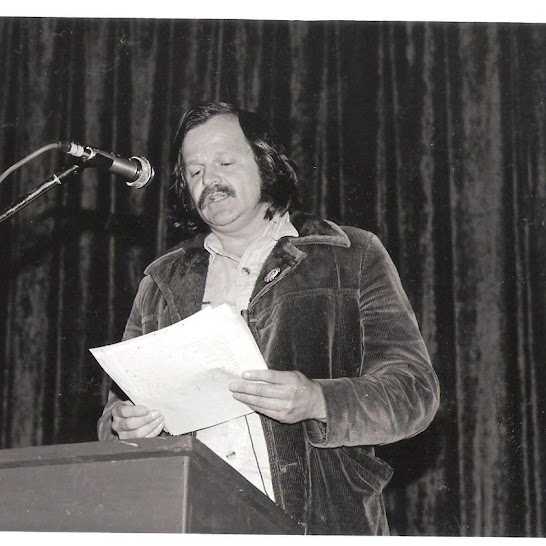In Allen's words:
I grew up in La Feria, Texas, a very small town (2,000 people, one stop light) in the Rio Grande Valley in deep South Texas, about 10 miles from the Rio Grande River, and the border with Mexico, and about 40 miles from South Padre Island, in the days when it was barely developed.
My wife, to whom I’ve been married for 45 years, is from San Benito, a slightly larger town near La Feria. We met through our work. She was a job counselor when we met, and later completed a 30-year career as a Juvenile Parole Officer and later Regional Parole Supervisor.
Terminally bored with college after two years, I joined the Peace Corps in 1964 and completed a semester of training at University of New Mexico. I completed the training but never had an overseas assignment.
Barely a year later in 1965, I joined the Air Force after receiving my draft notice two weeks before Christmas. Most of my first year of service was spent at Indiana University studying Russian for my military job as Russian Linguist. Before my discharge in 1969, I served in West Germany (before German reunification) and on the Northwest Frontier of Pakistan. My job in both places was monitoring the activities of the Russian Air Force.
Upon completing military service, I returned to complete my university degree at what is now Texas State. It was during that time that I made my first efforts at writing poetry, publishing two of my first poems in a journal in Austin.
After earning my degree I returned to the little town I came from and where I knew I would at least get fed. (After two years living on the GI Bill, I graduated with a very old car and 35 cents in my pocket.) I began work for a state agency as a Veteran’s Employment Counselor. I retired from the agency in 1998 as Regional Director. That was my first retirement. I’ve retired twice more since.
I quit writing when I began my professional career in 1971, I didn’t begin to write again until my retirement in 1999, publishing my first poem in 2000. I continued to write and publish in small journals until 2007 when I started my own blog/journal, Also, in 2007 I began a regimen of writing a poem every day. About a year ago I quit writing again, running out of ideas I hadn’t already covered during the previous 12 years of daily poems.
In 2007, I published my first book, Seven Beats a Second, my only print book, featuring my poems with art on every page by my collaborator, Vincent Martinez. The book is available on Amazon, both in a new print on demand version as well as, usually, used copies.
Following publication of that book, I published seven eBooks, five poetry books – Pushing Clouds Against the Wind, Goes Around, Comes Around, Always to the Light, Places and Spaces, and New Days, New Ways, and two books of fiction – Sonyador, the Dreamer and Peace in our Time.
The eBooks are available everywhere eBooks are sold, in the U.S. and overseas, including Amazon.
I continue to use my old poems today in a new blog, I began a couple of months ago at allenpoetryart.com. At the same time I quit writing, I tried my hand at art, abstract, spray on wood, large pieces, 10 to 12 inches by 4 to 5 feet. I have had one informal showing of my work and am scheduled for a more formal gallery showing early next year. The work is large and very unique, not painted to match anyone’s curtains, and I don’t expect to ever sell much, if any.
Currently, I’m 77, going on 78 years old, and not in particularly good health. My day is centered around two things, my blog and my art. Don’t have either the ability or interest for much else, so, like most old people, I make do with what I’ve got.
PURITY
FLESHWARE
Blood and gristle
Forged from the trash
Of exploding stars,
Fragile, short-lived,
Prone to sag
And corruption,
Helpless at birth,
Pitiful
In unremitting decay
Such poor use
Our body seems
Of the external elements
Of creation
But lightning strikes within
Tiny electric jabs that jump
From receptor to receptor
Creating art,
Imagining love,
Finding courage, honor,
Theories of own origin,
Joy and laughter
To mock the truth
Of our condition
So much more
Than we appear to be
Star dust
Offspring of unimaginable light
Seeking an antidote to dark
LOTSA HOTS
I’ve worked in August
Under the noon-day sun
Digging post holes
In hard-packed caliche
On the Texas-Mexico border
That’s one kind of hot
I’ve won six months’ pay
Throwing dice in Reno
That’s another kind of hot
I’ve seen pretty little whores
In Piedras Negras
Hot enough to melt the silver tip
Of a cowboy’s dress-up boots
That’s pretty hot, too
But no hot is as hot
As thinking of you and me
In a big white bed
In a room with curtains whispering
To a low midnight breeze,
Soft lights, satin shadows
Shifting over pale skin
Your dark eyes shining,
Liquid in their knowing




















